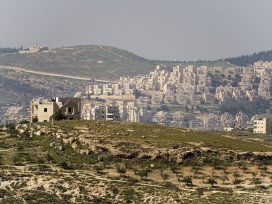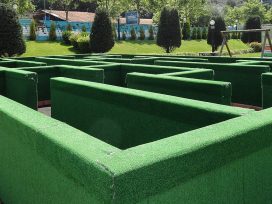Demostalgia and declinism
- Eurozine Review
8/2017
‘Transit’ finds inspiration in ‘89 one last time; ‘Arena’ goes out with a bang and a few parting shots; ‘Blätter’ assesses Merkel’s legacy and Macron’s nightmare; ‘Host’ explains Czech anti-westernism; ‘Res Publica Nowa’ discusses links between security and memory; ‘Kultūros barai’ focuses on cultural memory and history politics in Russia; ‘Esprit’ is haunted by postmemory; ‘Vikerkaar’ consults the ancients on dialectics and vegetarianism; ‘dérive’ returns democracy to the city; and ‘Index on Censorship’ puts its ear to the speaker.
Transit (Austria) 50 (2017)
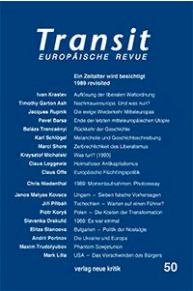
‘The first issue of the European Review Transit, the journal of the Institute for Human Sciences in Vienna, appeared in 1990, immediately after the fall of the Iron Curtain. The fiftieth – and final – issue of Transit again seems to coincide with a historic moment: today, are we not witnessing, just as unexpectedly, the dissolution of the very same liberal world order that was born then, less than three decades ago?’ With these words, Transit’s long-standing editor Klaus Nellen introduces an issue that looks back as much as it searches for answers to the most pressing questions facing Europe today, as it makes the transition to an uncertain future.
Post-Europe: ‘The post-1989 liberal order is unravelling before our eyes’ writes Ivan Krastev. ‘Why have central and eastern Europeans increasingly begun to vote for parties that openly loathe independent institutions such as courts, central banks and the media?’ Globalization, migration, populism and the failure of democratic institutions are keys to answering this question:
‘Leaders such as Orbán and Kaczyński offer illiberal democracy – majoritarian regimes in which the majority has turned the state into its own private possession – as an answer to the competitive pressure of a world where popular will is the only source of political legitimacy and global markets are the only source of economic growth. … The European project as we know it cannot long survive in an environment dominated by populist governments. The critical question, then, is who has more staying power, the EU or these regimes?’
Bulgaria: In one of several cases studies, Elitza Stanoeva introduces the concept of ‘demostalgia’, a nostalgic ‘rekindling of the sentiments of 1989’ which continues to inspire ‘89ers’, their children and post-1989 protests. At the same time, this ‘demostalgia’ is instrumentalized and distorted by the political parties – not unlike the nostalgia for communism that mobilizes support for the communist successor party the BSP. With political parties increasingly embracing nationalism and populism, and with the mafia in control, Bulgaria’s post-1989 history is, from a liberal perspective, a tale of disappointment.
‘While the “democratic right” shifts further away from the centre, the nominally “left” party, the BSP, rides the same populist scaremongering wave by suggesting that the EU is engineering an “ethnic change” in the country by forcing Bulgaria to accept refugees. In this, both “left” and “right” take a cue from the far-right parties that have surged in popularity over the last twelve years and which attack any commitment to the protection of minority rights or to trans-border solidarity as treason. Echoing the anti-liberal rhetoric that is gaining ground from central Europe to Russia, a war on “liberasty” has become a militant banner against any initiative in support of diversity.’
Fighting spirit: ‘We who believe in liberty and liberalism must fight back against the advancing armies of Trumpismo’, declares Timothy Garton Ash; while Karl Schlögelconsiders melancholy’s productive potential for historiography.
Also: ‘Snapshots’ by photographer and ‘visual historian’ Chris Niedenthal taken in Moscow, Peking, Poland, Berlin, Sofia and Cluj-Napoca in 1989, alongside an introduction with Niedenthal’s personal reminiscences.
More articles from Transit in Eurozine; Transit’s website
Arena (Sweden) 3-4/2017
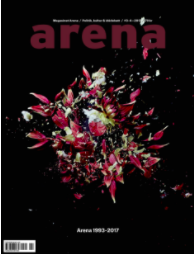
‘Some decisions are more painful than others. Like the decision to close down Arena after 24 years. This will be the last printed edition,’ announces Arena founder Håkan A. Bengtsson.
The magazine goes out with a bang – literally. The cover art shows an exploding bouquet of flowers, in white, pink and many shades of red. The issue is somewhere between sigh of nostalgia and cookbook for future editors. The main contribution is an interview with Per Wirtén, another of the founders, by former editor Malena Rydell.
‘The left was terrible back then’, recalls Wirtén. ‘You can’t even imagine how bad it was. No debate, and no interesting thoughts. Only voices in the periphery’. He continues: ‘As journalists we were liberals. It was a scary thought for many in the left, especially for the Swedish Social Democracy and worker’s movement. They wanted total control and obedient editors. In that respect, the worker’s movement resembled a sect.’
Being a pain in the ass to the Swedish left wasn’t Wirtén’s only motivation. He also took aim at ‘the older gentlemen sitting in their leather chairs doing philosophy’: ‘I think they are disgusting. In this case there isn’t any room for compromise, they make me puke. When I meet them I become like a hedgehog. They take everything for granted…’ However, he praises the middle class and their suburban habitat: the terraced houses with small lawns. Here, in his beloved Huddinge (approx. 15 kilometres south of Stockholm), he finds the forgotten story of today’s politics: the everyday struggle of the middle class.
Sein or Schein? Arena has always looked closely at European politics. The last edition is no exception. Editor Björn Werner attends a campaign rally with the German Social Democratic candidate Martin Schulz and becomes utterly depressed about the lack of politics. The rally is just a backdrop, a setting. Politics as appearance, not passion. Perhaps this is why the SPD failed in the recent German election?
Although the journal has closed down, the conglomerate, Arenagruppen – a think tank, publishing house, PR agency and a web-based daily – is still around.
More articles from Arena in Eurozine; Arena’s website
Blätter für deutsche und internationale Politik (Germany) 10/2017

The entry of Alternative für Deutschland into the Bundestag is a watershed moment in post-war German history and an indictment of twelve years of Merkel: never before has an openly far-right party had a seat in the federal German parliament. Analysing Germany’s election result, Blätter editor Albrecht von Lucke is unsparing in his criticism of the both parties of the centre.
‘Germany has paid a high price for the twelve years under alternating Merkel governments. One number stands for this above all: 53.5 per cent – the election result of the entire grand coalition. It expresses the fundamental decline of the people’s party as a model. … Beginning in 2005 with around 70 per cent, after two periods of office under Angela Merkel, the CDU–SPD coalition (interrupted by CDU–FDP) is no longer a ‘GroKo’ but merely the last remaining two-party coalition in German politics. Merkel has cannibalized her previous coalition partners in a quite astounding fashion, though not without huge assistance from the FDP and SPD themselves.’
FDP: Editor Steffen Vogel looks at the implications of the result for the French–German relationship and plans for European budgetary reform. The likely participation of the FDP in the governing coalition is Macron’s nightmare (‘If she joins up with the liberals, I’m dead’: Macron to Le Monde on 7 September). The FDP rejects a Eurozone budget that would, in the words of leader Christian Lindner, involve ‘laying a money pipeline from Germany that goes automatically to other EU countries for unspecific purposes’. An FDP in government would seek to make as few concessions as possible to France, not least with a view to Eurosceptic supporters of the AfD.
AfD: The success of the AfD has to a large extent been due to the party’s self-portrayal as victims of the press (the so-called Lügenpresse – ‘lying press’, a word used during National Socialism). The question of how to criticize the AfD through the media without putting wind in its sails is now more urgent than ever, writes Johannes Hillje.
More articles from Blätter in Eurozine; Blätter’s website
Host (Czech Republic) 7/2017
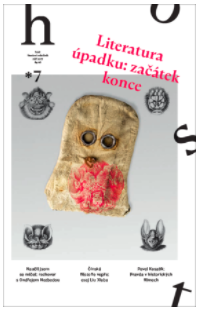
On the fiftieth anniversary of the legendary 1967 Congress of the Czechoslovak Writers’ Union, which heralded the Prague Spring, Host features previously unpublished photographs taken at the meeting. Several of the taboo-breaking speeches that incensed the communist establishment are still relevant today, writes historian Jan Mervart, most notably Milan Kundera’s claim ‘that the existence of a small nation is justified only if its culture makes a contribution relevant to European developments, rather than merely copying foreign models, [Ludvík] Vaculík’s call for an active citizenship that constantly holds up a mirror to politics, and [A.J.] Liehm’s ideas on liberating culture by abolishing the diktat of the market.’
Declinism: Most recent books by French and Czech writers dealing with the impending doom of western civilization lack historical perspective, writes Host editor Zdeněk Staszek. ‘Predicting the end of a civilization that can be avoided only by returning to mythical roots amounts to writing off the democratic project, human rights, equal rights and freedom – which nowadays enjoy the support of people who don’t fit any national, ethnic, gender or religious category and which, ironically, seem to represent civilisation’s greatest achievement. In short, western civilization is on the brink of collapse, having brought its end upon itself by winning its political battles.’
Anti-western and anti-European tendencies have been a feature of Czech political and philosophical discourse since the early nineteenth century, writes historian and philosopher Pavel Hlaváček. Beginning with the pan-Slavic movement, when prominent intellectuals and writers sought refuge in geopolitical and cultural affiliation with Russia, Czech anti-westernism continued well into the twentieth century, culminating after World War II, when Czechoslovakia became part of the Soviet bloc.
‘Admittedly, the Czech Lands, situated in the middle of Europe, have for a thousand years been a part of the West, albeit a part located on its broader eastern fringe and even on occasion serving as a dynamic centre of western civilization. If, however, intoxicated by a joyful declinism, we ourselves choose to renounce our allegiance to the West, or exclude ourselves from the western system, we mustn’t be surprised if this ‘divorce’ from the West, which we have been through at least once before in our history, is taken to heart and accepted (once again) by our friends and allies in western Europe and America.’
More articles from Host in Eurozine; Host‘s website
Res Publica Nowa (Poland) 3/2017
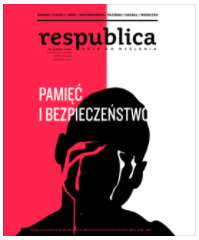
The information revolution has transformed the way states exert political pressure. In Res Publica Nowa, Stanislaw Koziej – brigadier general, military scientist and former head of the Polish National Security Bureau – asserts that Russia may be manipulating Polish and Ukrainian collective memory with a view to provoking tension between the two countries. ‘Some people still remember fights between civilians brandishing axes, flails and pitchforks … Emotion is so easily provoked and exploited … If Ukraine and Poland turn against each other, Ukraine would be cut off from the West … It’s a very dangerous game.’
Koziej is troubled by plans for Poland to achieve an independent defence strategy by 2030. ‘We can prepare to survive and not be crushed or broken politically, to function under occupation and conduct a sensible armed resistance, but not to defend ourselves militarily in the face of onslaught by a nuclear power … [However] if Nato is dissolved we will indeed have to fall back on an autarkic defence strategy … This has to be the contingency plan … The end of Nato is not some kind of sci-fi scenario, but entirely possible.’
Memory laws: Aleksandra Gliszczynska-Grabias reflects on how state-sanctioned politics of memory can curtail freedom of speech. ‘Memory laws determine the creation of a story about a place or community, and increasingly entail criminal penalties.’ Quoting European laws on Holocaust denial, a Russian law forbidding any questioning of the state-sanctioned account of the Great Patriotic War, and the protection given in Ukraine to the good name of the Insurgent Army (UPA – allegedly involved in massacres in Volhynia in the 1940s), she comments: ‘In their most dangerous guise, memory laws act not as protectors but as inquisitors defending a narrative in which “our” ancestors appear as victims of iniquity and betrayal, never as perpetrators or accomplices in historical crime.’
History from below: Krzysztof Wodiczka draws attention to the silence surrounding the ‘doubly defeated’: women, children, refugees and migrants, ethnic and sexual minorities. He calls Poland’s hierarchical social structure as ‘an extension of the feudal tradition’ and adds: ‘the mechanism that leads us to assume that some should be heard and honoured, while others aren’t worth bothering with, needs to be reset by education and the arts’.
More articles from Res Publica Nowa in Eurozine; Res Publica Nowa‘s website
Kultūros barai (Lithuania) 7–8+9/2017
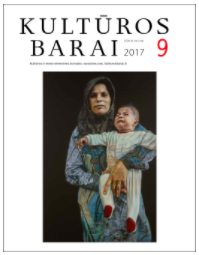
In Kultūros barai, historian Alvydas Nikžentaitis writes on ‘cultural memory and the history of politics in today’s Russia’, a two-part article based on his ambitious research project: The Modernization of Identities: The Challenges of Europeanization, Nationalism and Post-Sovietism to Cultural Memory.
Nikžentaitis admits that while it will be hard to say anything new on the subject, one can reveal many new aspects in a well-ploughed field by comparing Russian and German research on the topic. Although Russian researchers pay attention to publications in English, he explains, they completely ignore studies by German researchers, while the latter do not pay sufficient attention to research in Russia.
He begins with the German historian Stefan Troebst, who ‘in analyzing the cultures of memory in post-communist states and their relation to Communism, assigns Russia and Belarus to those countries which are the least distant from the communist tradition.’ In the final years of its existence, writes Nikžentaitis, the Soviet empire relied on three myths: the October Revolution, victory in the Great Patriotic War, and Progress. What place do these myths have in today’s Russia?
Between 1992 and 2000, interest in the past was minimal. Everything changed with an improvement in Russia’s economy and the lives of its citizens, and the arrival of Putin as the new president of Russia. Nikžentaitis concludes the first part by saying that although Russia’s elite is ambivalent as regards its country’s history, all of them want ‘the international community to regard Russia as a superstate’. In the second part, Nikžentaitis makes it clear that by 2013 the teaching of history and the fight against the so-called ‘falsification of history’ became the centre of Russian educational policy.
More articles from Kultūros barai in Eurozine; Kultūros barai’s website
Esprit (France) 10/2017
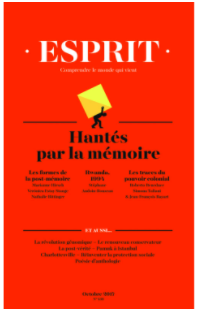
Esprit interrogates the memory of trauma across generations. ‘Postmemory’, a concept coined by literary scholar Marianne Hirsch, refers to the relationship that the ‘generation after’ bears to the traumas of its predecessors. How are the effects of violence transmitted from one generation to another? Can one remember a violent past without being condemned to re-enactment?
Writing in Esprit, Hirsch explains that the transmission of violent histories is not limited to the familial sphere. It takes roundabout routes through cultural and fictional representations, especially pictures, that fashion us against our will. Artistic and fictional forms help us experience the past differently and emancipate ourselves from compulsive repetition.
Rwanda: Stéphane Audoin-Rouzeau explains how the genocide of the Tutsi of Rwanda continues to impact on contemporary experience: survivors reenact crime scenes, especially during official commemorations; crimes are still committed on the field; French political officials deny responsibility. For the historian of WWI, studying Rwanda was an omen about our own societies’ capacity to turn violent.
Colonialism: According to Italian anthropologists and psychotherapists Roberto Beneduce and Simona Taliani, the colonial past has left traces on the minds, bodies and cultural representations of African migrants in Europe. Beneduce and Taliani describe how their reading of psychiatrist Frantz Fanon informs their method of working with their patients, without folklore or pity.
Post-truth: From dialectical materialism to neoliberalism, any politics that lays claims to the truth is both illusory and dangerous, argues Jean-Claude Monod. But does this mean that democracy is simply rule by opinion, without recourse to facts? And does the rejection of absolute relativism mean abandoning the postmodernist critique of truth and power? A contribution to the Eurozine focal point ‘Disinformation and democracy’.
More articles from Esprit in Eurozine; Esprit‘s website
Vikerkaar (Estonia) 9/2017
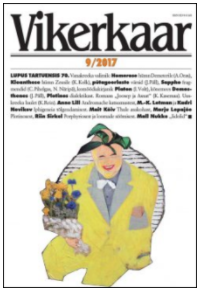
Dialectical thinking is usually equated with Marx and Hegel and most people who grew up in the Soviet Union probably feel queasy thinking about compulsory classes in ‘diamat’. However, dialectics has its roots in the thought of Plotinus, explains Marju Lepajõe. Arguing that contemporary society, though having overcome Marxism, is still dominated by a crude materialism, Lepajõe encourages a return to an idealist form of thinking and a dialectical engagement with society.
Plotinus thought that three kinds of people were particularly suited to dialectical thinking: musicians (who are in constant, intuitive dialogue with an ideal sound they aim to replicate), lovers (who are in constant awareness of their lack of perfection), and philosophers. ‘The lifelessness and poverty of ideas that has plagued social thought for some time and which it itself acknowledges (“some do not want, the others cannot”), in looking persistently only in one direction, towards that of economic relations, desperately needs to be refreshed from a mental opposition, dialectics, a search for the whole.’
Vegetarianism and the ancients: Riin Sirkel writes on how Porphyry defended vegetarianism in the third century BCE. Countering arguments that because animals were not reasoning beings, then there could be nothing unjust in eating them, Porphyry held that animals, being able to communicate via sound, to express emotions and feel pain, had an inner logos and should therefore be treated in the same way as relatives and other human beings.
‘Porphyry seems to think that, by harming creatures capable of feeling, we are also harming the most valuable part of ourselves, the reasoning soul, and refraining from eating animals therefore also maintains our own mental hygiene, keeping our soul ‘pure’, free of desire, capable of apprehending the truth.’
Also in the issue: Saphho’s poetry, the role of women in Greek drama, and selections of modern Greek poetry.
More articles from Vikerkaar in Eurozine; Vikerkaar‘s website
dérive (Austria) 10-12/2017
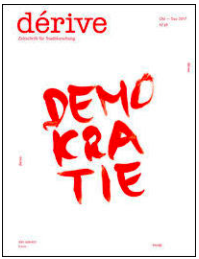
‘Democracy means that the future is open, and it is up to us to create it’, declares Mark Purcell in an issue of dérive devoted to the Austrian journal’s urbanize! festival, this year entitled ‘DEMOCRACitY’. The city will be celebrated as the ideal place for a thriving democracy, a bold statement at a time when ‘more people to doubt the functioning capacity of the ruling political class and thus of democracy itself,’ writes Purcell.
Consultation: Highlighting the city as a locus of change, editors Christoph Laimer and Elke Rauth interview author and journalist Niels Boeing, who talks about his experiences in the ‘right to the city’ movement in Hamburg. ‘Megacities see themselves as brands, and even small cities are encouraging city renovation programmes in order to be fit for the future.’ However, these are often top-down decisions by think tanks, city senates and councils. ‘The people affected by these programmes are often not consulted … even referendums are often an inadequate solution’, since the ‘debate is carried out in the media’ rather than directly with the people affected. Inevitably, the more money the better the media campaign.
As an alternative to private decision-making, Boeing suggests the commons, citing the National Trust and Community Land Trusts models from the UK. However, for real change ‘we probably need moments of crisis, like in the countries of southern Europe, where … people … have no other choice but to do it themselves.’
More articles from dérive in Eurozine; dérive‘s website
Index on Censorship (UK) 3/2017

Index on Censorship hails the ‘rebirth of radio’ and its unique ability to deliver the news, with a special report that includes despatches from Somalia, Syria, China and Nigeria. New formats like podcasting – a term coined only in 2004 – offer new possibilities. Podcasting ‘certainly draws less attention than erecting a radio transmitter, buying studio equipment and broadcasting live over closely monitored airwaves,’ writes Mark Frary. He profiles a podcaster in Vietnam, Loa.fm, which covers sensitive political stories, noting: ‘Like many podcasters operating in countries where freedom of speech is restricted, Loa has not explicitly sought permission from the authorities.’ The same goes for podcaster Christopher Farai Charamba in Zimbabwe. ‘We did not seek any approval to start Politics and Beyond, nor are we sure if we had to. We just started recording,’ says Charamba.
Mexico: Reporting is a dangerous job in Mexico. Duncan Tucker interviews Pablo Pérez, a freelancer who was held up by 100 armed men just a mile from an army checkpoint in southern Mexico: ‘They ransacked our vehicles and stole all our equipment, money and identification. … They told us they had informants at the checkpoint and that they’d burn us alive if we spoke to the soldiers.’ In May, Javier Valdez of news weekly Ríodoce was not so lucky. ‘When Valdez interviewed [a rival drug baron] in February 2017, [Joaquín ‘El Chapo’] Guzman’s sons … offered to buy the whole printrun, but Valdez remained firm. When the newspaper went out for distribution, cartel gunmen followed the delivery trucks … and bought up every copy.’ Colleagues think this refusal led to Valdez’s assassination.
Nudism: Jemimah Steinfeld profiles campaigners seeking to free the female nipple, including Nadine Gary, president of GoTopless.com. ‘She can’t leave her house topless [because] in sweltering Las Vegas, where Gary lives, public exposure of female nipples is a criminal offence. “If I go out in the garden, I have to have a top on, but my husband does not,” she said’. Later this year, campaigners will argue their case before the US Supreme Court. Until then, there’s always ‘the Internet Acceptable Male Nipple Template, a cut-out of a male nipple that women can paste over their own.’
More articles from Index on Censorship in Eurozine; Index on Censorship’s website
The Eurozine Review presents a selection of the latest issues of Eurozine partner journals, summarizing their contents in English as a way of encouraging cultural and political dialogue between national public spheres in Europe.

Published 13 October 2017
Original in English
First published by Eurozine
© Eurozine
PDF/PRINTNewsletter
Subscribe to know what’s worth thinking about.


